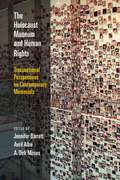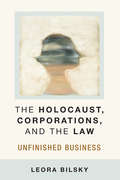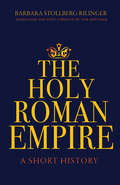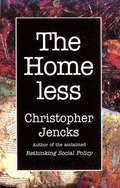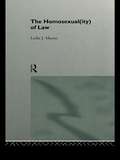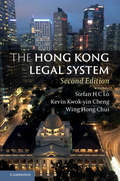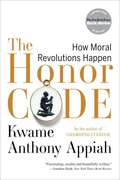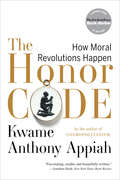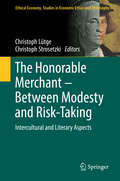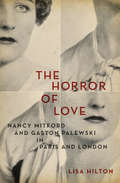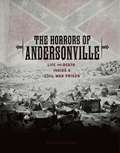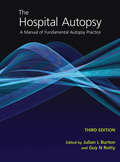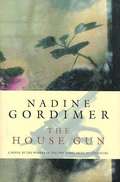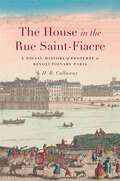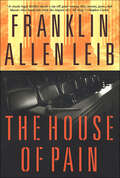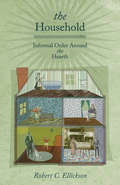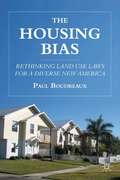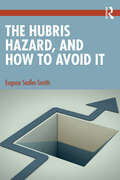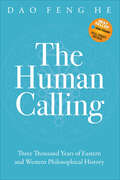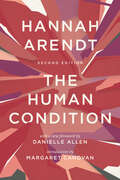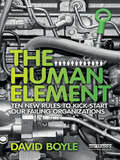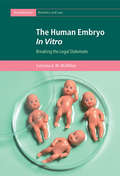- Table View
- List View
The Holocaust Museum and Human Rights: Transnational Perspectives on Contemporary Memorials (Pennsylvania Studies in Human Rights)
by American PhilosoInterrogates the global, and often controversial, phenomenon of Holocaust and human rights museumsSpanning six continents—Europe, Australia, Africa, Asia, North America, and South America—this edited collection offers a comparative, transnational study of Holocaust and human rights museums that foregrounds the overlapping and often contested work these institutions do in narrating and memorializing histories of genocide and human rights abuses for a public audience. Museums that link the Holocaust with social justice, human rights, and genocide prevention have been founded in many countries—for example, the Kazerne Dossin Memorial Museum in Belgium, the Anne Frank House in the Netherlands, and the Johannesburg Holocaust and Genocide Centre in South Africa—making Holocaust and human rights museums a global phenomenon. It is not uncommon for these institutions to court controversy by linking the Holocaust to human rights issues in their locales and abroad. Some begin from a “Holocaust core” and extrapolate from this history to address broader concerns, while others integrate the Holocaust as “a” or, at times, “the” case study par excellence of human rights abuses. Other institutions that may not explicitly focus on the Holocaust continue to engage these representational practices to highlight other instances of genocide and human rights abuses.The case studies in this book illuminate the convergences between Holocaust and human rights museums in their demands for social justice and reparation, educational and activist purpose, design principles, and curatorial choices. But it also shows how these museums can also be sites of contestation around how stories of suffering, courage, and survival are told; whose stories are prioritized; and who is consulted. Although Holocaust museums were once the most influential form of representation of human rights issues in the international museum and heritage fields, they are now in dialogue—visually, spatially, methodologically—with museums and memorial sites concerned with human rights more broadly. Interrogating debates in both museology and Holocaust memory studies, this volume reveals how institutions dedicated to these concerns have become active and influential contributors to local, national, and transnational dialogues about human rights.Contributors: Avril Alba, Brook Andrew, Jennifer Barrett, Jennifer Carter, Danielle Celermajer, Steven Cooke, Donna-Lee Frieze, Shirli Gilbert, Sulamith Graefenstein, Christoph Hanzig, Vannessa Hearman, Rosanne Kennedy, Marcia Langton, Edwina Light, Wendy Lipworth, A. Dirk Moses, Tali Nates, Jessica Neath, Michael Robertson, Amy Sodaro, Garry Walter.
The Holocaust, Corporations, and the Law: Unfinished Business
by Leora Yedida BilskyThe Holocaust, Corporations, and the Law explores the challenge posed by the Holocaust to legal and political thought by examining issues raised by the restitution class action suits brought against Swiss banks and German corporations before American federal courts in the 1990s. Although the suits were settled for unprecedented amounts of money, the defendants did not formally assume any legal responsibility. Thus, the lawsuits were bitterly criticized by lawyers for betraying justice and by historians for distorting history. Leora Bilsky argues class action litigation and settlement offer a mode of accountability well suited to addressing the bureaucratic nature of business involvement in atrocities. Prior to these lawsuits, legal treatment of the Holocaust was dominated by criminal law and its individualistic assumptions, consistently failing to relate to the structural aspects of Nazi crimes. Engaging critically with contemporary debates about corporate responsibility for human rights violations and assumptions about “law,” she argues for the need to design processes that make multinational corporations accountable, and examines the implications for transitional justice, the relationship between law and history, and for community and representation in a post-national world. Her novel interpretation of the restitution lawsuits not only adds an important dimension to the study of Holocaust trials, but also makes an innovative contribution to broader and pressing contemporary legal and political debates. In an era when corporations are ever more powerful and international, Bilsky’s arguments will attract attention beyond those interested in the Holocaust and its long shadow.
The Holy Roman Empire: A Short History
by Yair Mintzker Barbara Stollberg-RilingerA new interpretation of the Holy Roman Empire that reveals why it was not a failed state as many historians believeThe Holy Roman Empire emerged in the Middle Ages as a loosely integrated union of German states and city-states under the supreme rule of an emperor. Around 1500, it took on a more formal structure with the establishment of powerful institutions—such as the Reichstag and Imperial Chamber Court—that would endure more or less intact until the empire's dissolution by Napoleon in 1806. Barbara Stollberg-Rilinger provides a concise history of the Holy Roman Empire, presenting an entirely new interpretation of the empire's political culture and remarkably durable institutions.Rather than comparing the empire to modern states or associations like the European Union, Stollberg-Rilinger shows how it was a political body unlike any other—it had no standing army, no clear boundaries, no general taxation or bureaucracy. She describes a heterogeneous association based on tradition and shared purpose, bound together by personal loyalty and reciprocity, and constantly reenacted by solemn rituals. In a narrative spanning three turbulent centuries, she takes readers from the reform era at the dawn of the sixteenth century to the crisis of the Reformation, from the consolidation of the Peace of Augsburg to the destructive fury of the Thirty Years' War, from the conflict between Austria and Prussia to the empire's downfall in the age of the French Revolution.Authoritative and accessible, The Holy Roman Empire is an incomparable introduction to this momentous period in the history of Europe.
The Homeless
by Christopher JencksHow widespread is homelessness, how did it happen, and what can be done about it? These are the questions explored by Christopher Jencks, America's foremost analyst of social problems. Jencks examines the standard explanations and finds that the deinstitutionalization of the mentally ill, the invention of crack cocaine, rising joblessness among men, declining marriage rates, cuts in welfare benefits, and the destruction of skid row have all played a role. Changes in the housing market have had less impact than many claim, however, and real federal housing subsidies actually doubled during the 1980s. Not confining his mission to studying the homeless, Jencks proposes several practical approaches to helping the homeless.
The Homevoter Hypothesis: How Home Values Influence Local Government Taxation, School Finance, and Land-Use Policies
by William A. FischelJust as investors want the companies they hold equity in to do well, homeowners have a financial interest in the success of their communities. If neighborhood schools are good, if property taxes and crime rates are low, then the value of the homeowner’s principal asset—his home—will rise. Thus, as William Fischel shows, homeowners become watchful citizens of local government, not merely to improve their quality of life, but also to counteract the risk to their largest asset, a risk that cannot be diversified. Meanwhile, their vigilance promotes a municipal governance that provides services more efficiently than do the state or national government. Fischel has coined the portmanteau word “homevoter” to crystallize the connection between homeownership and political involvement. The link neatly explains several vexing puzzles, such as why displacement of local taxation by state funds reduces school quality and why local governments are more likely to be efficient providers of environmental amenities. The Homevoter Hypothesis thereby makes a strong case for decentralization of the fiscal and regulatory functions of government.
The Homosexual(ity) of law
by Leslie MoranFirst published in 1996. Routledge is an imprint of Taylor & Francis, an informa company.
The Hong Kong Legal System
by Wing Hong Chui Stefan H. Lo Kevin Kwok-yin ChengThis book provides an introduction to the legal system in Hong Kong. Understanding Hong Kong's legal system today requires both an understanding of the British origins of much of the laws and legal institutions as well as the uniquely Hong Kong developments in the application of the Basic Law under 'one country, two systems'. These features of the Hong Kong legal system are explored in this book, which takes into account developments in the two decades or so of the new legal framework in Hong Kong since the 1997 handover. In providing both an exposition of the legal institutions in Hong Kong and legal method under Hong Kong's legal system (including practical guidance and examples on case law, statutory interpretation and legal research), this book is ideal for first-year law students, students of other disciplines who study law and readers who have an interest in Hong Kong's unique legal system.
The Honor Code: How Moral Revolutions Happen
by Kwame Anthony AppiahA leading philosopher demonstrates the revolutionary power of honor in ending human suffering.
The Honor Code: How Moral Revolutions Happen
by Kwame Anthony Appiah"[Appiah's] work reveals the heart and sensitivity of a novelist. . . .Fascinating, erudite and beautifully written."--The New York Times Book Review In this groundbreaking work, Kwame Anthony Appiah, hailed as "one of the most relevant philosophers today" (New York Times Book Review), changes the way we understand human behavior and the way social reform is brought about. In brilliantly arguing that new democratic movements over the last century have not been driven by legislation from above, Appiah explores the end of the duel in aristocratic England, the tumultuous struggles over footbinding in nineteenth-century China, the uprising of ordinary people against Atlantic slavery, and the horrors of "honor killing" in contemporary Pakistan. Intertwining philosophy and historical narrative, he has created "a fascinating study of moral evolution" (Philadelphia Inquirer) that demonstrates the critical role honor plays a in the struggle against man's inhumanity to man.
The Honorable Merchant – Between Modesty and Risk-Taking: Intercultural and Literary Aspects (Ethical Economy #56)
by Christoph Lütge Christoph StrosetzkiThis volume explores the concept of the honest merchant, taking a broad perspective and covering a wide range of aspects. It looks at the different types of “honest merchant” conceptions originating from different cultures and literary traditions. The book covers Japanese, Islamic, Scandinavian, Russian, German, Spanish, as well as other aspects, and studies different disciplinary backgrounds of the honest merchant, such as philosophical, economic, neuroethical, sociological and literary ones.The concept of the honest merchant has a long tradition in business ethics. In the Hanseatic League and in medieval Italy, the ideal of the honest businessman was taught since the late Middle Ages. It originated during a time when travelling merchants were often regarded with a sceptical eye. The honest merchants of their time however held clear principles in their business and took responsibility for their community. In later times, the religious notions of the concept lost their pivotal place to reason and morality. This book goes beyond the tradition of discussing business ethics in association with concepts from the Hanseatic League and medieval Italy, and puts the central concept of business ethics in a much greater perspective.
The Horror of Love: Nancy Mitford and Gaston Palewski in Paris and London
by Lisa HiltonThe dramatic love story of two extraordinary individuals--Nancy Mitford and free French commander Gaston Palewski--living in extraordinary times."Oh, the horror of love!" Nancy Mitford once exclaimed to her sister Diana Mosley.Elegant and intelligent, Nancy was a reknowned wit and a popular author. Yet this bright, waspish woman gave her heart to a well-known philanderer who went on to marry another woman. Was Nancy that unremarkable thing--a deluded lover--or was she a remarkable woman engaged in a sophisticated love affair? Gaston Palewski was a Free French commander and one of the most influential politicians in post-war Europe. She supported him throughout his tumultuous career and he inspired some of her best work, including The Pursuit of Love.Lisa Hilton's provocative and emotionally challenging book reveals how, with discipline, gentleness, and a great deal of elegance, Nancy Mitford and Gaston Palewski achieved an affair of the heart.
The Horrors of Andersonville: Life and Death Inside a Civil War Prison
by Catherine GourleyDescribes life in Andersonville, a notorious Confederate prisoner-of-war camp during the last months of the American Civil War.
The Hospital Autopsy: A Manual of Fundamental Autopsy Practice, Third Edition
by Guy Rutty Julian BurtonNow in full colour, this new and revised edition of The Hospital Autopsy presents a clear and systematic approach to safe and effective modern autopsy practice for pathologists. It begins by discussing issues such as legislation governing autopsies, religious attitudes and ensuring safety, before covering the procedures of external examination, evi
The House Gun
by Nadine GordimerNadine Gordimer's novel is a passionate narrative of the complex manifestations of that final test of human relations we call love. It moves with the restless pace of living itself; if it is a parable of present violence, it is also an affirmation of the will to reconciliation that starts where it must, between individual men and women.
The House That Jack Built (Matthew Hope #8)
by Ed McbainAfter Ralph Parrish exchanges angry words with his brother Jonathan, he is charged with murder when Jonathan is found dead on the kitchen floor.
The House in the Rue Saint-Fiacre: A Social History of Property in Revolutionary Paris (Harvard Historical Studies)
by H. B. CallawayA bold account of property reform during the French Revolution, arguing that the lofty democratic ideals enshrined by revolutionary leaders were rarely secured in practice—with lasting consequences.Property reform was at the heart of the French Revolution. As lawmakers proclaimed at the time, and as historians have long echoed, the Revolution created modern property rights. Under the new regime, property was redefined as an individual right to which all citizens were entitled. Yet as the state seized assets and prepared them for sale, administrators quickly found that realizing the dream of democratic property rights was far more complicated than simply rewriting laws.H. B. Callaway sifts through records on Parisian émigrés who fled the country during the Revolution, leaving behind property that the state tried to confiscate. Immediately, officials faced difficult questions about what constituted property, how to prove ownership, and how to navigate the complexities of credit arrangements and family lineage. Mothers fought to protect the inheritances of their children, tenants angled to avoid rent payments, and creditors sought their dues. In attempting to execute policy, administrators regularly exercised their own judgment on the validity of claims. Their records reveal far more continuity between the Old Regime and revolutionary practices than the law proclaimed. Property ownership continued to depend on webs of connections beyond the citizen-state relationship, reinforced by customary law and inheritance traditions. The resulting property system was a product of contingent, on-the-ground negotiations as much as revolutionary law.The House in the Rue Saint-Fiacre takes stock of the contradictions on which modern property rights were founded. As Callaway shows, the property confiscations of Parisian émigrés are a powerful, clarifying lens on the idea of ownership even as it exists today.
The House of Pain
by Franklin Allen LeibFranklin Allen Leib, a former naval officer and the highly acclaimed author of the bestselling Fire Arrow, has crafted a legal thriller as suspenseful as it is thought-provoking in The House of Pain. When a spoiled teen is kidnapped outside her prestigious prep school, her parents are faced with the horror only those who've lost a child can know. In their desperation, afraid to contact the police, they enlist the help of millionaire "Crazy Johnny," a former Vietnam tunnel rat. A sufferer from post-traumatic stress disorder due to the brutality he saw children endure in the war, he agrees to help the girl's father, but is afraid that if they pay up, the girl will be killed anyway. Crazy Johnny tracks down the kidnappers, determined that the only way to save Sally is to free her by force. Blood is spilled, and only in its aftermath does the true nature of the crime emerge. It is then up to the United States legal system to judge Johnny's vigilantism, and up to an old-time attorney and a young woman lawyer to see that justice emerges from the courtroom."An interesting story, this legal thriller will make a fast read for teens." - School Library JournalAt the Publisher's request, this title is being sold without Digital Rights Management Software (DRM) applied.
The Household: Informal Order around the Hearth
by Robert C. EllicksonSome people dwell alone, many in family-based households, and an adventuresome few in communes. The Household is the first book to systematically lay bare the internal dynamics of these and other home arrangements. Legal underpinnings, social considerations, and economic constraints all influence how household participants select their homemates and govern their interactions around the hearth. Robert Ellickson applies transaction cost economics, sociological theory, and legal analysis to explore issues such as the sharing of household output, the control of domestic misconduct, and the ownership of dwelling units. Drawing on a broad range of historical and statistical sources, Ellickson contrasts family-based households with the more complex arrangements in medieval English castles, Israeli kibbutzim, and contemporary cohousing communities. He shows that most individuals, when structuring their home relationships, pursue a strategy of consorting with intimates. This, he asserts, facilitates informal coordination and tends ultimately to enhance the quality of domestic interactions. He challenges utopian critics who seek to enlarge the scale of the household and legal advocates who urge household members to rely more on written contracts and lawsuits. Ellickson argues that these commentators fail to appreciate the great advantages in the home setting of informally associating with a handful of trusted intimates. The Household is a must-read for sociologists, economists, lawyers, and anyone interested in the fundamentals of domestic life.
The Housing Bias
by Paul BoudreauxArguing that our laws are skewed to benefit entrenched homeowners, at the expense of newcomers and lower-income households, this bookadvocates both for libertarian ideals and for social justice - an unusual and revealing combination. Boudreaux explores how we could scrap the old housing bias in favor of affluent homeowners, and in its place harness the free market to provide for a greater variety of residences - apartments, townhouses, and mobile homes - for the twenty-first century. "
The Hubris Hazard, and How to Avoid It
by Eugene Sadler-SmithHubris is something we’ve all seen in action and experienced all too often. It’s a significant occupational hazard and a serious potential derailment factor for leaders, organisations, and civil society. Hubristic leaders - intoxicated as they are with power, praise, and success–behave in ways that, if left unchecked, invite unintended and unforeseen negative consequences which impact destructively on individuals, industries, economies, and nations.Despite numerous examples throughout history of hubris’ destructive consequences, it nonetheless appears to be an ever-present and growing danger. Many leaders seem to be blind to the hazards of hubris and oblivious to the lessons of history. Prevention is better than cure and understanding the nature of the hubris hazard and the associated risk factors will help leaders and managers improve their personal performance and avoid derailment and, even more importantly, protect the well-being of employees and the resilience of their organisations over the long term. This book explains the characteristics, causes, and consequences of hubris, and shows how to combat the significant hazard it poses to managers, leaders, organisations, and society. With contemporary examples, each chapter explores a particular ‘hubris risk factor’ and shows how the risk can be managed and mitigated and exposure to the hubris hazard minimised.The Hubris Hazard, and How to Avoid It offers practical guidance and action points for managers and leaders on how to recognise hubris in themselves and others and what to do to combat it when it arises. It will also be useful for business and executive coaches and leadership trainers and developers.
The Human Calling: Three Thousand Years of Eastern and Western Philosophical History
by Dao Feng HeA study of the world’s religious movements and what their history says about society today.The Human Calling is a vigorously researched and profoundly spiritual narrative history of the world’s religious movements as they relate to society’s collective understanding of the duties they have to fellow people and looks ahead to what lessons from history can be applied as people navigate a technological age.Focusing on the rise and fall of spiritual movements in both the East and West, The Human Calling examines what the world’s major religions have historically offered, asks what people are here for outside of pure survival, and makes the persuasive argument for Christianity as the best leader to guide individuals on the path toward better caring for one another—our human calling. The Human Calling takes readers through humanity’s three great thought movements:The first is the Axial Age, the source of the first great human reflection on public spirit and public orderThe second is the twelfth to seventeenths centuries, wrestles with the question of whether people can attain individual rationality in God’s orderThe third delves into the independent reasoning societies of the twentieth and twenty-first centuries and looks forward to what people want their third great reflection on God’s plan to be during their own period of societal flux
The Human Condition: Second Edition
by Hannah ArendtThe renowned political thinker and author of The Origins of Totalitarianism examines the troubling consequences of humanity’s increasing power.A work of striking originality, The Human Condition is in many respects more relevant today than when it first appeared in 1958. In her study of the state of modern humanity, Hannah Arendt considers humankind in terms of its ever-expanding capabilities. Her analysis reveals a troubling paradox: that as human powers increase through technological and humanistic inquiry, we are less equipped to control the consequences of our actions. This new edition contains Margaret Canovan’s 1998 introduction and a new foreword by Danielle Allen. A classic in political and social theory, The Human Condition offers a penetrating analysis of a conundrum that has only become more acute in the 21st century.
The Human Element: Ten New Rules to Kickstart Our Failing Organizations
by David BoyleDespite some of the most sophisticated computer systems known to mankind, modern life can be infuriating – and it's getting worse. But there is a growing suspicion that, despite all the investment in IT and organization we have seen, we live with the same old problems we always have done. Why are we still addicted to oil and petrol despite the disastrous consequences? Why, three generations after the Beveridge Report, are his Five Giants – Want, Disease, Idleness, Ignorance and Squalor – still so much with us? Why did teenage pregnancies go up despite the UK government spending up to £100 million over a decade to prevent them? Why do so few of the public clocks tell the right time or train lavatories have water in their taps? There is a growing understanding, not that people are infallible, or that they are endlessly trustworthy and benevolent – but they are nonetheless what makes change possible. This book uses this idea to set out the Ten New Rules for organizations, reveals where they are working already – with the latest developments in ideas like system thinking and co-production. It explains the future in terms of the People Principle: If you employ imaginative and effective people, especially on the frontline, and give them the freedom to innovate, they will succeed. If you don't, they will fail.
The Human Embryo In Vitro: Breaking the Legal Stalemate (Cambridge Bioethics and Law)
by Catriona A. McMillanThe Human Embryo in vitro explores the ways in which UK law engages with embryonic processes under the Human Fertilisation and Embryology Act 1990 (as amended), the intellectual basis of which has not been reconsidered for almost thirty years. McMillan argues that in regulating 'the embryo' – that is, a processual liminal entity in itself - the law is regulating for uncertainty. This book offers a fuller understanding of how complex biological processes of development and growth can be better aligned with a legal framework that purports to pay respect to the embryo while also allowing its destruction. To do so it employs an anthropological concept, liminality, which is itself concerned with revealing the dynamics of process. The implications of this for contemporary regulation of artificial reproduction are fully explored, and recommendations are offered for international regimes on how they can better align biological reality with social policy and law.
The Human Face of the European Union
by Nuno Ferreira Dora Kostakopoulou Julia Bradshaw Swati GolaThis collection asks a direct but complex question: is the EU humane enough? The implementation of EU law and policy and its balance between economic and social values continues to provoke debate. Providing fresh insight, Nuno Ferreira and Dora Kostakopoulou present a novel analytical framework, centred on the notion of humaneness, for assessing EU law and policy. This innovative approach leads to recommendations for policy change towards a more humanistic philosophy for the EU. Broad in its scope, this remarkable volume draws together interdisciplinary perspectives from contributors who examine key EU law and policy fields, including economic integration, asylum and free movement, citizenship and development, and security. This book is essential reading for scholars, students and policy-makers seeking new ways of exploring the economic versus social values debate in EU law.
